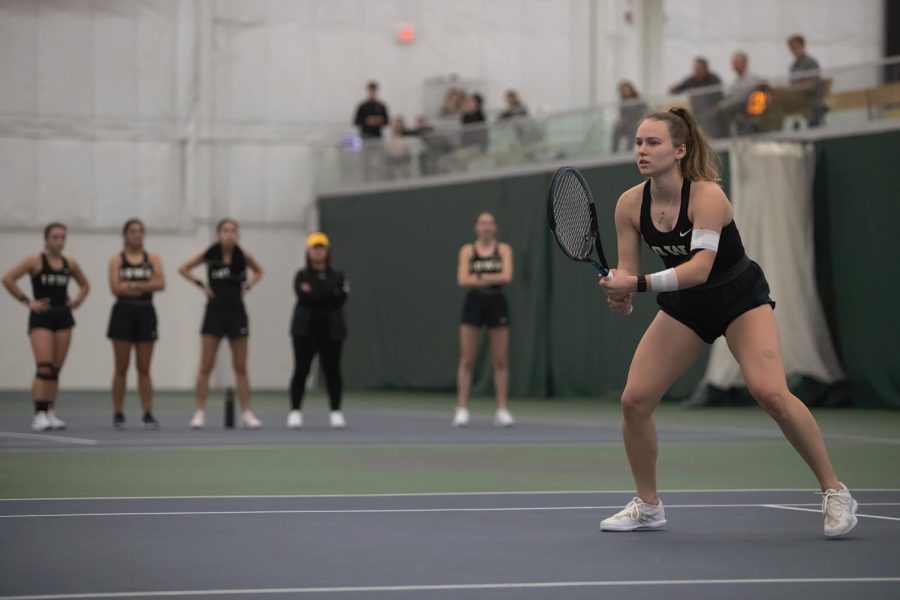Bringing energy serves well in collegiate tennis matches
Iowa’s Pia Kranholdt stands ready during a women’s tennis meet at the Hawkeye Tennis & Recreational Complex. The Hawkeye’s defeated the Wildcat’s, 4,1, on Sunday, Feb. 5, 2023.
March 5, 2023
Iowa women’s tennis player Samantha Mannix will always remember that road match. On March 13, 2021, Mannix and the Hawkeyes faced off against Illinois at Atkins Tennis Center in Champaign, Illinois.
Iowa had won their previous meeting against the Illini, a 4-2 victory in Iowa City. One month later, the team played in an environment that Mannix, now a fifth-year senior, won’t soon forget.
“They have a similar facility to us, an extended row, and they had a lot of people show up,” Mannix said. “They had their men’s team cheering against us. And we definitely felt the pressure … especially if they have those spectators cheering against you when you double fault or when you miss, anything like that.”
Iowa lost the match, 4-3, amid an atmosphere typical of the collegiate tennis scene — where both the crowd and players let their voices be heard.
“I think college tennis matches are a lot more enthusiastic and energetic than normal professional tournaments,” Iowa head coach Sasha Schmid said. “That whole idea that you have to be quiet is not the same environment in college tennis. I think it’s a unique atmosphere in that it can be rowdy, loud, and spirited.”
The Hawkeyes feature two international freshmen this season in Daianne Hayashida from Lima, Peru, and Pia Kranholdt from Karlsruhe, Germany. Schmid said her coaching emphasizes reminding her freshmen to embrace the loud environment.
“You kind of have to get your freshman to understand that it’s OK to scream and yell,” Schmid said. “It’s also because it’s the first time they’ve probably played a team because, you know, it’s been an individual sport.”
Mannix agreed with Schmid, saying experience allows international recruits to gradually grow comfortable with speaking up.
“It’s definitely an adjustment for everyone who comes into college,” Mannix said. “I think, especially for the international kids, it’s a little bit of a shock to the system sometimes. You kind of just, after the first few matches, have to embrace the environment and realize that being loud is a part of college tennis. Being energetic and positive isn’t something that’s really going to hurt you and doesn’t have a downside.”
Ever since Schmid’s first year coaching at Iowa in 2016, the team has always done some version of the iconic “I-O-W-A” chant. This year, the Hawkeyes all huddle in a circle with arms wrapped around one another, swaying back and forth while rhythmically shouting the letters.
“Any time it’s right at the beginning of the match, that makes a difference,” Mannix said. “You always want to start out with positivity because realistically the match has just started, and it can go either way … I think it’s nice that we all do [the chant] together this year.”
Mannix said she has learned when to be positive and outspoken over the course of her career. She said it’s essential for teammates to hear your voice and see positive body language during crucial games against quality opponents.
“There’s times when it can help your team, just knowing that somebody is doing well on the court next to you, or bringing up the positivity,” Mannix said. “I think sometimes when it comes down to tight matches, that’s when it’s really important, when it can really go one way or another … Against teams that are equal, or a quality team, it’s really important to stay positive, be loud, and make sure you’re motivating your teammates so that they’re not looking over and your shoulders are slumped.”
On the court, fans can hear Mannix yell her trademark celebration of “come on” after every point she scores. Other players display similar celebrations — with international recruits, these exclamations are sometimes in foreign languages.
“It happens for everybody — there’s different variations,” Mannix said. “If you’re international, everybody has their own form of cheering. You hear, ‘Yes,’ ‘Come on,’ ‘Let’s go,’ and everything. It’s kind of just whatever you can yell loudest at the time … If your teammates on the other side can hear it, then you’re doing a good job.”
Calling herself one of the louder voices on the team, Mannix said having enthusiasm in college tennis comes from the team aspect of the sport.
“Just realizing that, in a college match, it’s not just about yourself, and that if you need to be loud to help your teammates, that’s what you do,” Mannix said.
Schmid said the greatest benefit of embracing the environment is good performance, which ultimately determines the outcome of the match.
“[The result of the match] is going to come down to tennis, but I do think that energy has to come before the tennis and not the other way around,” Schmid said. “Because if you’re waiting to play well to have energy, then it’s always kind of the wrong way of thinking about it. Your energy has to bring good tennis.”



